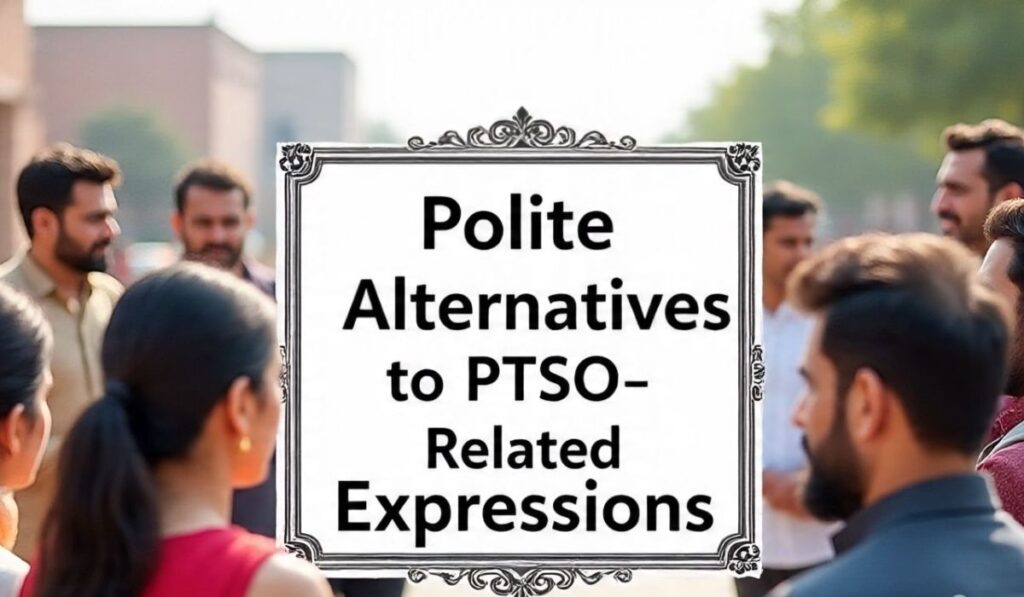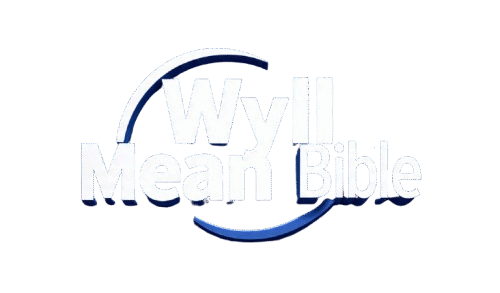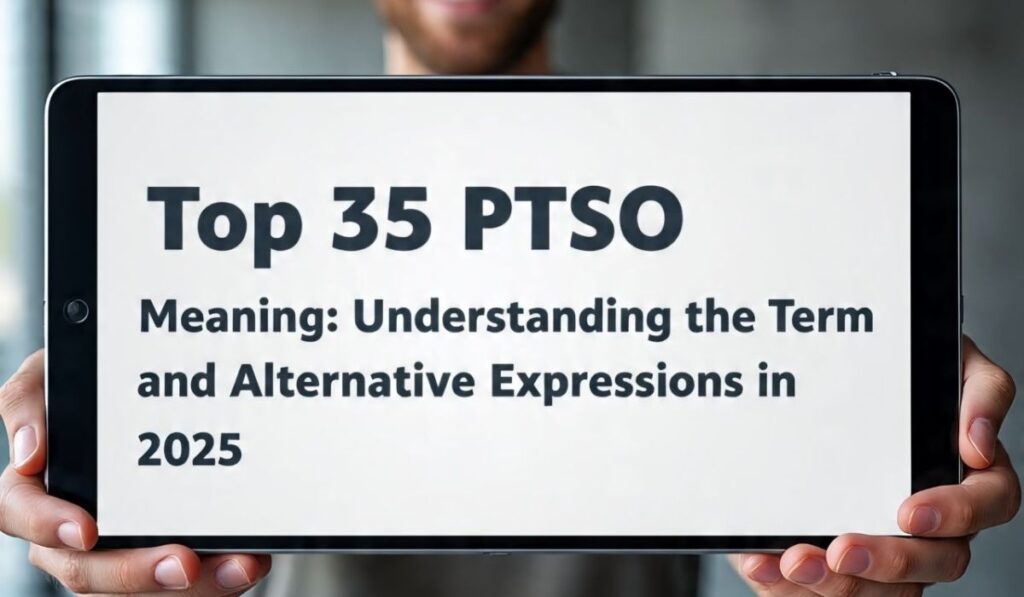In 2025, the term PTSO continues to evolve in meaning and usage across various social, professional, and digital contexts. Once primarily associated with “Post-Traumatic Stress Order” in casual slang or mistaken for PTSD, PTSO has now taken on broader interpretations ranging from workplace abbreviations like “Part-Time Schedule Only” to cultural and humorous uses online.
This guide explores the Top 35 meanings of PTSO, offering clarity on its different interpretations and introducing polite, professional, and casual alternatives that better fit specific conversations or environments. Understanding these nuances helps ensure respectful and effective communication in today’s fast-changing linguistic landscape.
What Does PTSO Mean?
PTSO is a multifaceted acronym that can carry different meanings depending on the context in which it’s used. Most commonly, it’s a mistaken variation of PTSD (Post-Traumatic Stress Disorder), often used casually or humorously online, though this usage can be insensitive or misleading.
In professional or academic settings, PTSO may stand for things like Parent Teacher Student Organization, Part-Time Schedule Only, or other context-specific terms.
Its versatility and growing presence in digital communication have made it a catch-all abbreviation that can cause confusion or unintended offense, highlighting the importance of understanding the setting before using or interpreting the term.
Polite Alternatives to PTSO-Related Expressions

When discussing sensitive topics like trauma or mental health especially in informal or online settings it’s important to choose language that is respectful, empathetic, and clear.
Using casual or joking expressions like “PTSO” can come off as dismissive or trivializing, particularly to those who genuinely experience post-traumatic stress.
Instead, adopting polite alternatives helps promote thoughtful conversation while avoiding misunderstandings or offense. These alternatives also create a more supportive and inclusive environment.
Example Usage:
In everyday conversations especially when reflecting on emotionally charged moments using polite alternatives to terms like “PTSO” helps maintain empathy and respect. For instance, instead of jokingly saying “I’ve got PTSO from that meeting,” someone might say, “I’m feeling overwhelmed right now. I just need a few minutes to reset.”
Professional Alternatives to PTSO-Related Expressions
In professional environments, it’s essential to communicate emotional strain or stress in a respectful, composed, and appropriate manner. Casual slang like “PTSO” can come off as unprofessional or insensitive, especially when referring to workplace challenges or personal hardships.
Using thoughtful and polished language not only maintains professionalism but also fosters a supportive and respectful atmosphere. Below are professional alternatives that can be used to express emotional impact or mental fatigue without trivializing serious conditions like PTSD.
Example Usage:
After presenting to the executive board, she admitted, “That situation was mentally exhausting, but I’m glad we made it through.” In the team meeting, another colleague noted, “It was a high-stress environment, and I’m still debriefing from that experience.”
Casual Alternatives to PTSO-Related Expressions

In casual conversations with friends or on social media, it’s still important to express stress or emotional overwhelm in a way that’s lighthearted without being disrespectful. Instead of using potentially insensitive slang like “PTSO,” there are more thoughtful, everyday phrases that keep things relatable while avoiding offense.
- “That totally threw me off.”
A laid-back way to express surprise or discomfort. - “I’m still not over that.”
Lighthearted yet honest, often used when something lingers emotionally or mentally. - “That messed with my head.”
Informal and expressive, great for casual chats among close friends. - “I can’t unsee that.”
Humorous and vivid, perfect for pop culture or awkward moments. - “That lives in my head rent-free.”
A trendy, fun way to say something keeps replaying in your mind good or bad.
Example Usage:
After watching a bizarre movie scene, someone might laugh and say, “I can’t unsee that it lives in my head rent-free.” When recalling an awkward moment, a friend could joke, “That totally threw me off, I’m still not over it.”
Instead of saying “PTSO,” these lighthearted expressions keep things relatable and fun without making light of serious issues, making them perfect for everyday conversation.
How to Choose the Best Alternative
- Consider the Context
Use formal alternatives in professional settings and casual ones with friends or on social media. - Be Sensitive to the Audience
Avoid slang or humor when speaking with someone who may have real trauma or emotional history. - Match the Tone
Choose words that reflect the seriousness or lightness of the situation—don’t overstate or downplay. - Use Empathetic Language
Opt for alternatives that show care and understanding rather than dismissiveness or sarcasm. - Avoid Medical Misuse
Steer clear of using mental health terms inaccurately; use plain language to describe stress or emotion. - Prioritize Clarity
Pick phrases that are easy to understand and don’t require the listener to interpret vague or coded language. - Keep it Respectful
Choose expressions that respect both your experience and others’ possible reactions to your words. - Lean Into Honesty
Instead of masking discomfort with slang, describe how you truly feel in a grounded way. - Adapt Based on Feedback
If someone reacts negatively to your phrasing, be willing to switch to something more appropriate. - Stay Current, But Mindful
Using trendy language is fine, but only if it doesn’t trivialize serious topics or cause confusion.
Optimized Texting Examples
- “That meeting drained me and I needed a quick breather.”
- “I still can’t stop thinking about what happened earlier.”
- “That convo hit harder than I expected.”
- “Lowkey still recovering from that moment ”
- “Today was a lot mentally tapped out.”
- “That really stuck with me.”
- “I’m kinda off today, that threw me a bit.”
- “Still shaking off those weird vibes.”
- “Feeling the ripple effects from that… yikes.”
- “My brain’s still buffering after that”
Conclusion
In 2025, the evolving use of PTSO reflects the changing ways we communicate stress, emotional impact, and life experiences both online and offline. While the term may appear in slang, memes, or workplace jargon, it’s essential to understand its varied meanings and use alternatives that suit the context, tone, and audience.
Whether you’re aiming for professionalism, empathy, or casual relatability, choosing thoughtful expressions over insensitive shorthand shows emotional awareness and respect. By exploring the top 35 meanings and appropriate alternatives, we become better equipped to express ourselves clearly, responsibly, and kindly in any conversation.

Muhammad Shoaib is an expert writer in Bible meaning, quotes, bible, Prayers, and pick-up lines, known for crafting creative, catchy, and SEO-friendly content that connects and captivates audiences.






